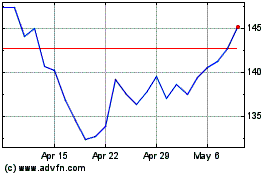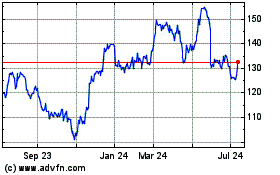Agilent Companion Diagnostic Gains Expanded FDA Approval in Esophageal Squamous Cell Carcinoma (ESCC)
July 31 2019 - 2:15PM
Business Wire
PD-L1 IHC 22C3 pharmDx can now be used as an aid to identify
ESCC patients
Agilent Technologies Inc. (NYSE: A) today announced that the
U.S. Food and Drug Administration (FDA) has approved the company’s
PD-L1 IHC 22C3 pharmDx assay for expanded use.
The assay is now approved as an aid in identifying patients with
ESCC for treatment with KEYTRUDA (pembrolizumab), an anti-PD-1
therapy manufactured by Merck (known as MSD outside the United
States and Canada). KEYTRUDA is approved for patients with
recurrent locally advanced or metastatic ESCC whose tumors express
PD-L1 [Combined Positive Score (CPS) ≥ 10] as determined by an
FDA-approved test, with disease progression on or after one prior
line of systemic therapy.
PD-L1 IHC 22C3 pharmDx is the only companion diagnostic
FDA-approved to aid in identifying ESCC patients for second-line
treatment with KEYTRUDA. This is the sixth cancer type for which
PD-L1 IHC 22C3 pharmDx has gained FDA approval in the United
States.
“PD-L1 has been established as an essential biomarker for
PD-1/PD-L1 checkpoint inhibitors,” said Sam Raha, president of
Agilent’s Diagnostics and Genomics Group. “As a growing number of
patients are becoming eligible for treatment with these inhibitors,
pathologists’ confidence in their PD-L1 test is critical. With the
approval of expanded use of our PD-L1 IHC 22C3 pharmDx assay,
Agilent is able to aid in the identification of patients with ESCC
for treatment with KEYTRUDA, while providing pathologists the
quality, reliability, and accuracy they need to ensure diagnostic
confidence.”
In the United States, esophageal cancer is expected to cause
approximately 16,000 deaths in 2019.3 ESCC accounts for
approximately 30% of all esophageal cancers diagnosed in the United
States4 and has a 5-year survival rate of 12%.5
Agilent developed PD-L1 IHC 22C3 pharmDx in collaboration with
Merck.
KEYTRUDA is a humanized monoclonal antibody that increases the
ability of the body's immune system to help detect and fight tumor
cells. KEYTRUDA blocks the interaction between PD-1 and its
ligands, PD-L1 and PD-L2, thereby activating T lymphocytes, which
may affect both tumor cells and healthy cells. KEYTRUDA and other
targeted immunotherapies are revolutionizing cancer treatment, with
their therapeutic value being demonstrated across a growing list of
cancer types.
Agilent is a worldwide leader in partnering with pharmaceutical
companies to develop immunohistochemical-based diagnostics for
cancer therapy. Agilent developed PD-L1 IHC 22C3 pharmDx in
partnership with Merck. PD-L1 IHC 22C3 pharmDx also helps
physicians identify non-small cell lung cancer (NSCLC), cervical
cancer, gastric or GEJ adenocarcinoma, urothelial carcinoma and
head and neck squamous cell carcinoma (HNSCC) patients for
treatment with KEYTRUDA. PD-L1 expression in NSCLC tissues is
interpreted using Tumor Proportion Score (TPS). PD-L1 expression in
HNSCC, urothelial carcinoma, cervical cancer, gastric or GEJ
adenocarcinoma, and ESCC tissues is interpreted using Combined
Positive Score (CPS).
About Agilent Technologies
Agilent Technologies Inc. (NYSE: A) is a global leader in life
sciences, diagnostics and applied chemical markets. With more than
50 years of insight and innovation, Agilent instruments, software,
services, solutions, and people provide trusted answers to
customers' most challenging questions. The company generated
revenues of $4.91 billion in fiscal 2018 and employs 15,500 people
worldwide. Information about Agilent is available at
www.agilent.com. To receive the latest Agilent news, subscribe to
our Newsroom. Follow Agilent on LinkedIn, Twitter, and
Facebook.
References: 1. PD-L1 IHC 22C3 pharmDx
[package insert]. Carpinteria, CA: Dako, Agilent Pathology
Solutions; 2019. 2. Keytruda [package insert].
Kenilworth, NJ: Merck, Inc.; 2019. 3. American
Cancer Society. Facts & Figures 2019.
https://www.cancer.org/content/dam/cancer-org/research/cancer-facts-and-statistics/annual-cancer-facts-and-figures/2019/cancer-facts-and-figures-2019.pdf
(accessed July 26, 2019). 4. SEER Cancer
Statistics Review 1975–2016. National Cancer Institute.
https://seer.cancer.gov/csr/1975_2016/ (accessed July 26, 2019).
5. Kahn, A.; Crowell, M.D.; Fleischer, D.E.
Reducing the Risk of Esophageal Squamous Cell Carcinoma: Out with
the Old; in with the New. Gastrointestinal Endoscopy.
2019, 89(4), 733–735.
View source
version on businesswire.com: https://www.businesswire.com/news/home/20190731005857/en/
Victoria Wadsworth-Hansen Agilent Technologies +1 408 553 2005
+45 2933 6980 victoria.wadsworth-hansen@agilent.com
Agilent Technologies (NYSE:A)
Historical Stock Chart
From Mar 2024 to Apr 2024

Agilent Technologies (NYSE:A)
Historical Stock Chart
From Apr 2023 to Apr 2024
